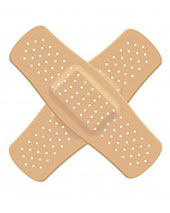NOTE: This page contains an alternative set of resources for Week 5 and is designed specifically for people who are experiencing significant physical discomfort due to chronic pain, fibromyalgia, serious injury or physical disability. All the materials you'll need for this week are given below, but you should also look over the main Week 5 page.
"Physical" vs "Emotional" Pain
The complex interaction between physical, emotional and mental realms makes it inaccurate to say a discomfort is "just mental/emotional" or "just physical". Significant physical pain is emotionally difficult and significant emotional pain has physical consequences and correlates. Even so, there are some physical conditions that are so difficult that a special approach may be helpful.
Videos
In addition to Turning Toward Difficulty and The Three Components of Self-Compassion, which are also on the main Week 5 page, Mindfulness-Based Pain Management goes into more detail about dealing with difficult or chronic pain. This is an inspiring video in which Vidyamala Burch of Breathworks talks about her journey with the chronic pain and disability that began with an accident when she was a teenager, and in which she describes her novel approach to chronic pain. Jon Kabat-Zinn calls Vidyamala's approach "the most comprehensive, in-depth, scientifically up-to-date and user-friendly approach to learning the how of living with chronic pain and reclaiming one’s life that I know of." If you'd like to know even more about her story, there are several interesting interviews of her in the supplementary materials.
You don't need to view Awakening Self-Compassion by Tara Brach, but it is a great video and if you have time and would like to see it, you'll find it located on the main Week 5 page.
Readings
The suggestions for informal practice described in Week 5 can be very helpful with physical issues, but Vidyamala's Five-Step PAIN process is likely to be more effective. The Five-Step Model, describes this process in detail, and The Five-Step PAIN process is a one-page summary which will be useful for the informal practice. Two readings also given on the main Week 5 page are Buddhism's Pain Relief and The Strange Case of Chronic Back Pain (a must-read if you or someone you know has back issues, and if so, see also Ron Siegel's Back Sense in the supplementary section).
Practice
The formal practice is the same as is given in Week 5. As indicated there, we focus a little more on the sitting meditation, alternating it with your choice of one of the other practices. On the first day, though, if you have something that happened that is mildly difficult, try the Soften, Soothe, Allow Meditation (see it on the menu to the left). The situation doesn't have to be a major issue, in fact, it's best if it's mild or moderate. For instance, it could be impatience while waiting in line or being mildly annoyed by some minor event.
For the daily informal practice, instead of Soften-Soothe-Allow, try the Five-Step PAIN process at times when you are experiencing physical discomfort or pain. The discomfort doesn't have to be major, it could just be a minor ache or physical irritation. If you are lucky enough to have a day with no aches or pains to speak of, take the time to feel gratitude for this or something else that happened that day. If you like, you can also try the Soften, Soothe, Allow process on one or two days instead of the Five-Step PAIN process (if you'd like to do this, more info about Soften, Soothe, Allow, as well as practice sheets, are given on main Week 5 page).
Below are your materials for this week:
Videos
Turning Toward Difficulty - Vidyamala Burch [10 min]
Mindfulness-Based Pain Management - Vidyamala Burch [21 min]
The Three Components of Self-Compassion - Kristin Neff [6 min]
Reading
The Five-Step Model - Vidyamala Burch
The Five-Step PAIN Process - description of Vidyamala Burch's "Five Step Model"
Buddhism's Pain Relief - Rick Heller
The Strange Case of Chronic Back Pain - Ron Siegel
Practice sheets
Formal Practice [PDF] or [WORD format] - Various (Soften-Soothe-Allow Meditation on 1st day)
Informal Practice [PDF] or [WORD format] - see The Five-Step PAIN Process
Supplementary materials helpful for dealing with physical pain
YOU Are Not Your Pain book by Vidyamala Burch
Back Sense: Halting the Cycle of Chronic Back Pain book by Ron Siegel
Living Well With Pain & Illness book by Vidyamala Burch
How To Be Sick book by Toni Bernhard
Explain Pain book by David Butler
Vidyamala Burch interview video (more detail about Vidyamala's story) [58 min]
Choosing to Live Well with Pain & Illness audio interview of Vidyamala Burch [39 min]
Choosing to Live Well with Pain & Illness transcript of above interview
NOTE: If you are compiling a manual based on the suggestions in MBSR Manual, you would print a copy of this page as well as the Readings and Practice Sheets given above. For a version of this page which has been reformatted for your manual go to the printer-ready version of this page.



